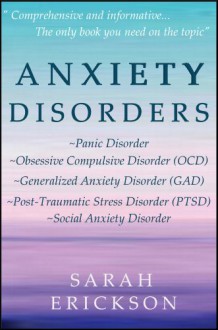Anxiety Disorders: Panic Disorder, Obsessive Compulsive Disorder (OCD), Generalized Anxiety Disorder (GAD), Post-Traumatic Stress Disorder (PTSD), and Social Anxiety Disorder
Anxiety disorders range from feelings of uneasiness to immobilizing bouts of terror. This book briefly describes the different types of anxiety disorders. This book intends to be a starting point towards understanding anxiety disorders and therefore is not exhaustive and does not include the full...
show more
Anxiety disorders range from feelings of uneasiness to immobilizing bouts of terror. This book briefly describes the different types of anxiety disorders. This book intends to be a starting point towards understanding anxiety disorders and therefore is not exhaustive and does not include the full range of symptoms and treatments. Keep in mind that new research can yield rapid and dramatic changes in our understanding of and approaches to mental disorders. If you believe you or a loved one has an anxiety disorder, seek competent, professional advice or another form of support.According the mental health experts, there are five (5) different anxiety disorders. Each of the following five (5) are discussed in this book:Panic Disorder: People with panic disorder experience white-knuckled, heart-pounding terror that strikes suddenly and without warning. Since they cannot predict when a panic attack will seize them, many people live in persistent worry that another one could overcome them at any moment.Obsessive Compulsive Disorder: If you have OCD, you have repeated, upsetting thoughts called obsessions. You do the same thing over and over again to try to make the thoughts go away. Those repeated actions are called compulsions.Examples of obsessions are a fear of germs or a fear of being hurt. Compulsions include washing your hands, counting, checking on things or cleaning. Untreated, OCD can take over your life. Post-traumatic Stress Disorder: Researchers now know that anyone, even children, can develop PTSD if they have experienced, witnessed, or participated in a traumatic occurrence-especially if the event was life threatening. PTSD can result from terrifying experiences such as rape, kidnapping, natural disasters, or war or serious accidents such as airplane crashes. The psychological damage such incidents cause can interfere with a person's ability to hold a job or to develop intimate relationships with others.Social Anxiety Disorder: Most of us steer clear of certain, hazardous things. Phobias however, are irrational fears that lead people to altogether avoid specific things or situations that trigger intense anxiety. Social Anxiety Disorder is a phobia marked by a fear of being extremely embarrassed in front of other people. The most common social phobia is fear of public speaking. Phobias occur in several other forms, for example, agoraphobia is the fear of being in any situation that might trigger a panic attack and from which escape might be difficult. Generalized Anxiety Disorder: Most people experience anxiety at some point in their lives and some nervousness in anticipation of a real situation. However if a person cannot shake unwarranted worries, or if the feelings are jarring to the point of avoiding everyday activities, he or she most likely has an anxiety disorder.
show less
Format: kindle
ASIN: B0082ZNIUY
Publish date: May 12th 2012
Publisher: Digital Direct Ebooks
Pages no: 48
Edition language: English

